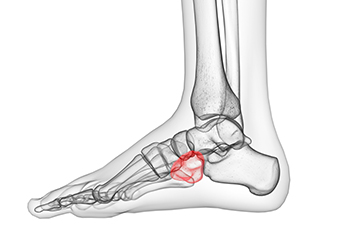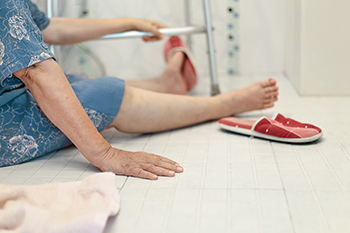Blog
Potential Consequences of High Heels
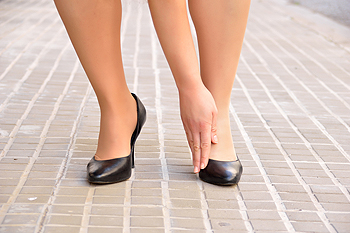 As popular as they are, high heels can bring a variety of long-term consequences to the overall health of the feet. Because they cause strides to be shorter and with more force and cause the toes to be in a flexed position, the calf muscles can shorten and may strain easily. Also, once someone who regularly wears high heels starts wearing flat shoes, like sneakers or flip flops, there is an increased chance of injury due to the feet being placed in a new environment. A variety of conditions can be caused by regularly wearing high heels, including hammertoes, bunions, sprained ankles, bone fractures, or ligament tears. If you have been injured because of wearing high heels, or simply seek advice on avoiding injuries, it is suggested that you visit a podiatrist for more information.
As popular as they are, high heels can bring a variety of long-term consequences to the overall health of the feet. Because they cause strides to be shorter and with more force and cause the toes to be in a flexed position, the calf muscles can shorten and may strain easily. Also, once someone who regularly wears high heels starts wearing flat shoes, like sneakers or flip flops, there is an increased chance of injury due to the feet being placed in a new environment. A variety of conditions can be caused by regularly wearing high heels, including hammertoes, bunions, sprained ankles, bone fractures, or ligament tears. If you have been injured because of wearing high heels, or simply seek advice on avoiding injuries, it is suggested that you visit a podiatrist for more information.
High heels have a history of causing foot and ankle problems. If you have any concerns about your feet or ankles, contact one of our podiatrists from James Kutchback, DPM, CWS-P. Our doctors can provide the care you need to keep you pain-free and on your feet.
Effects of High Heels on the Feet
High heels are popular shoes among women because of their many styles and societal appeal. Despite this, high heels can still cause many health problems if worn too frequently.
Which Parts of My Body Will Be Affected by High Heels?
- Ankle Joints
- Achilles Tendon – May shorten and stiffen with prolonged wear
- Balls of the Feet
- Knees – Heels cause the knees to bend constantly, creating stress on them
- Back – They decrease the spine’s ability to absorb shock, which may lead to back pain. The vertebrae of the lower back may compress.
What Kinds of Foot Problems Can Develop from Wearing High Heels?
- Corns
- Calluses
- Hammertoe
- Bunions
- Morton’s Neuroma
- Plantar Fasciitis
How Can I Still Wear High Heels and Maintain Foot Health?
If you want to wear high heeled shoes, make sure that you are not wearing them every day, as this will help prevent long term physical problems. Try wearing thicker heels as opposed to stilettos to distribute weight more evenly across the feet. Always make sure you are wearing the proper shoes for the right occasion, such as sneakers for exercising. If you walk to work, try carrying your heels with you and changing into them once you arrive at work. Adding inserts to your heels can help cushion your feet and absorb shock. Full foot inserts or metatarsal pads are available.
If you have any questions, please feel free to contact our offices located in The Woodlands and Woodville, TX . We offer the newest diagnostic and treatment technologies for all your foot care needs.
How Turf Toe Occurs
 One common sports injury that occurs in the big toe is known as turf toe. This condition, which is most common among football and soccer players, happens when the big toe is sprained because of a repetitive upward bending of the joint. This action usually takes place when the big toe is jammed or injured when pushing off while jumping or running. Turf toe is extremely common when playing on turf, particularly because the foot is more likely to stick to the hard surface under it and jam. Common indications of turf toe include pain, swelling, and a lack of joint movement in the big toe. Turf toe is often treated by rest, ice, compression and elevation, but in extreme cases, surgery may be necessary. Athletes who notice that they have symptoms similar to turf toe would be wise to check with a podiatrist who can properly diagnose and treat the injury.
One common sports injury that occurs in the big toe is known as turf toe. This condition, which is most common among football and soccer players, happens when the big toe is sprained because of a repetitive upward bending of the joint. This action usually takes place when the big toe is jammed or injured when pushing off while jumping or running. Turf toe is extremely common when playing on turf, particularly because the foot is more likely to stick to the hard surface under it and jam. Common indications of turf toe include pain, swelling, and a lack of joint movement in the big toe. Turf toe is often treated by rest, ice, compression and elevation, but in extreme cases, surgery may be necessary. Athletes who notice that they have symptoms similar to turf toe would be wise to check with a podiatrist who can properly diagnose and treat the injury.
Ankle and foot injuries are common among athletes and in many sports. They can be caused by several problems and may be potentially serious. If you are feeling pain or think you were injured in a sporting event or when exercising, consult with one of our podiatrists from James Kutchback, DPM, CWS-P. Our doctors will assess your condition and provide you with quality foot and ankle treatment.
Common Injuries
The most common injuries that occur in sporting activities include:
- Achilles Tendonitis
- Achilles Tendon Rupture
- Ankle Sprains
- Broken Foot
- Plantar Fasciitis
- Stress Fractures
- Turf Toe
Symptoms
Symptoms vary depending upon the injury and in some cases, there may be no symptoms at all. However, in most cases, some form of symptom is experienced. Pain, aching, burning, bruising, tenderness, tightness or stiffness, sensation loss, difficulty moving, and swelling are the most common symptoms.
Treatment
Just as symptoms vary depending upon the injury, so do treatment options. A common treatment method is known as the RICE method. This method involves rest, applying ice, compression and elevating the afflicted foot or ankle. If the injury appears to be more serious, surgery might be required, such as arthroscopic or reconstructive surgery. Lastly, rehabilitation or therapy might be needed to gain full functionality in the afflicted area. Any discomfort experienced by an athlete must be evaluated by a licensed, reputable medical professional.
If you have any questions please contact our offices located in The Woodlands and Woodville, TX . We offer the newest diagnostic and treatment technologies for all your foot and ankle needs.
Cuboid Syndrome Can Cause Pain on the Outside of Your Feet
Cuboid syndrome occurs when the cuboid bone in the midfoot becomes partially dislocated (subluxes). This can occur during an acute injury such as an inversion sprain of the ankle, or over time from jumping, running, etc., which can place repetitive strain on the muscle which attaches to the lateral (outer) side of the foot. When the cuboid bone subluxes, this can prevent surrounding bones from moving properly. It is believed that having flat feet, or a gait where your foot rolls inward when you walk may put you at higher risk of developing cuboid syndrome. Symptoms of cuboid syndrome can include lateral foot pain which worsens in the morning or during activity, swelling and tenderness in the area, an overall feeling of weakness or difficulty when walking, running or jumping. If you believe you may have cuboid syndrome, make an appointment with a podiatrist as soon as possible. They will use a variety of imaging and physical tests to assess your condition and create a comprehensive treatment plan to guide the cuboid bone back into position and relieve pain and swelling.
Cuboid syndrome, also known as cuboid subluxation, occurs when the joints and ligaments near the cuboid bone in the foot become torn. If you have cuboid syndrome, consult with one of our podiatrists from James Kutchback, DPM, CWS-P. Our doctors will assess your condition and provide you with quality foot and ankle treatment.
Cuboid syndrome is a common cause of lateral foot pain, which is pain on the outside of the foot. The condition may happen suddenly due to an ankle sprain, or it may develop slowly overtime from repetitive tension through the bone and surrounding structures.
Causes
The most common causes of cuboid syndrome include:
- Injury – The most common cause of this ailment is an ankle sprain.
- Repetitive Strain – Tension placed through the peroneus longus muscle from repetitive activities such as jumping and running may cause excessive traction on the bone causing it to sublux.
- Altered Foot Biomechanics – Most people suffering from cuboid subluxation have flat feet.
Symptoms
A common symptom of cuboid syndrome is pain along the outside of the foot which can be felt in the ankle and toes. This pain may create walking difficulties and may cause those with the condition to walk with a limp.
Diagnosis
Diagnosis of cuboid syndrome is often difficult, and it is often misdiagnosed. X-rays, MRIs and CT scans often fail to properly show the cuboid subluxation. Although there isn’t a specific test used to diagnose cuboid syndrome, your podiatrist will usually check if pain is felt while pressing firmly on the cuboid bone of your foot.
Treatment
Just as the range of causes varies widely, so do treatments. Some more common treatments are ice therapy, rest, exercise, taping, and orthotics.
If you have any questions, please feel free to contact our offices located in The Woodlands and Woodville, TX . We offer the newest diagnostic and treatment technologies for all your foot care needs.
When to See the Podiatrist for a Broken Toe
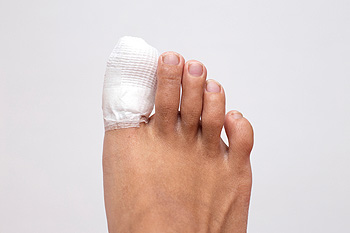 If you have injured your toe and notice that it is red, bruised, swollen, painful, or difficult to walk on, you may have broken your toe. A mild toe fracture may respond to conservative treatments, such as resting and icing the foot, taking pain medication, wearing comfortable shoes or orthotics, and taping the broken toe to the healthy toe next to it. A more severe fracture, however, will require more serious medical intervention. If you have injured your toe and have pain or swelling that lingers after two or three days, have difficulty walking up to six weeks after the initial injury, or if you have diabetes, it is suggested that you seek the care of a podiatrist. If you have an open fracture, with the broken bone poking through your skin, please seek medical attention immediately to prevent permanent damage and infections. For more information, please consult with a podiatrist.
If you have injured your toe and notice that it is red, bruised, swollen, painful, or difficult to walk on, you may have broken your toe. A mild toe fracture may respond to conservative treatments, such as resting and icing the foot, taking pain medication, wearing comfortable shoes or orthotics, and taping the broken toe to the healthy toe next to it. A more severe fracture, however, will require more serious medical intervention. If you have injured your toe and have pain or swelling that lingers after two or three days, have difficulty walking up to six weeks after the initial injury, or if you have diabetes, it is suggested that you seek the care of a podiatrist. If you have an open fracture, with the broken bone poking through your skin, please seek medical attention immediately to prevent permanent damage and infections. For more information, please consult with a podiatrist.
A broken toe can be very painful and lead to complications if not properly fixed. If you have any concerns about your feet, contact one of our podiatrists from James Kutchback, DPM, CWS-P. Our doctors will treat your foot and ankle needs.
What to Know About a Broken Toe
Although most people try to avoid foot trauma such as banging, stubbing, or dropping heavy objects on their feet, the unfortunate fact is that it is a common occurrence. Given the fact that toes are positioned in front of the feet, they typically sustain the brunt of such trauma. When trauma occurs to a toe, the result can be a painful break (fracture).
Symptoms of a Broken Toe
- Throbbing pain
- Swelling
- Bruising on the skin and toenail
- The inability to move the toe
- Toe appears crooked or disfigured
- Tingling or numbness in the toe
Generally, it is best to stay off of the injured toe with the affected foot elevated.
Severe toe fractures may be treated with a splint, cast, and in some cases, minor surgery. Due to its position and the pressure it endures with daily activity, future complications can occur if the big toe is not properly treated.
If you have any questions, please feel free to contact our offices located in The Woodlands and Woodville, TX . We offer the newest diagnostic and treatment technologies for all your foot care needs.
Falling: Causes and Prevention
Falls are a leading cause of injury among older adults. In fact, every year a third of all Americans aged 65 or older experience a fall. Falls among the elderly can cause serious injury and mobility issues, as well as damage to their self-esteem and independence. Falls are typically caused by muscle weakness, mobility or balance issues, the side-effects of a medication, or the fear of falling. The best way to prevent falls is to exercise regularly, implement specific measures to make the home environment safer, manage medications, and maintain proper foot and ankle health. For more information about preventing falls, please consult with a podiatrist.
Preventing falls among the elderly is very important. If you are older and have fallen or fear that you are prone to falling, consult with one of our podiatrists from James Kutchback, DPM, CWS-P. Our doctors will assess your condition and provide you with quality advice and care.
Every 11 seconds, an elderly American is being treated in an emergency room for a fall related injury. Falls are the leading cause of head and hip injuries for those 65 and older. Due to decreases in strength, balance, senses, and lack of awareness, elderly persons are very susceptible to falling. Thankfully, there are a number of things older persons can do to prevent falls.
How to Prevent Falls
Some effective methods that older persons can do to prevent falls include:
- Enrolling in strength and balance exercise program to increase balance and strength
- Periodically having your sight and hearing checked
- Discuss any medications you have with a doctor to see if it increases the risk of falling
- Clearing the house of falling hazards and installing devices like grab bars and railings
- Utilizing a walker or cane
- Wearing shoes that provide good support and cushioning
- Talking to family members about falling and increasing awareness
Falling can be a traumatic and embarrassing experience for elderly persons; this can make them less willing to leave the house, and less willing to talk to someone about their fears of falling. Doing such things, however, will increase the likelihood of tripping or losing one’s balance. Knowing the causes of falling and how to prevent them is the best way to mitigate the risk of serious injury.
If you have any questions, please feel free to contact our offices located in The Woodlands and Woodville, TX . We offer the newest diagnostic and treatment technologies for all your foot care needs.
The Diabetic Foot
Diabetes is a systemic condition. This means that it affects the whole body, including the feet. Foot problems that stem from diabetes include peripheral neuropathy, a form of nerve damage, and diabetic foot ulcers, a type of open wound that can occur on the feet and become infected when left unnoticed. Between 40 and 60 million diabetics worldwide suffer from lower limb complications each year. The best way to prevent these problems is to stay vigilant of any changes in your feet by performing daily foot inspections. Look at your feet carefully and take note of anything unusual, such as cuts, scrapes, sores, discoloration, or strange sensations. If you notice that something is off, seek the care of a podiatrist as soon as possible.
Diabetic foot care is important in preventing foot ailments such as ulcers. If you are suffering from diabetes or have any other concerns about your feet, contact one of our podiatrists from James Kutchback, DPM, CWS-P. Our doctors can provide the care you need to keep you pain-free and on your feet.
Diabetic Foot Care
Diabetes affects millions of people every year. The condition can damage blood vessels in many parts of the body, especially the feet. Because of this, taking care of your feet is essential if you have diabetes, and having a podiatrist help monitor your foot health is highly recommended.
The Importance of Caring for Your Feet
- Routinely inspect your feet for bruises or sores.
- Wear socks that fit your feet comfortably.
- Wear comfortable shoes that provide adequate support.
Patients with diabetes should have their doctor monitor their blood levels, as blood sugar levels play such a huge role in diabetic care. Monitoring these levels on a regular basis is highly advised.
It is always best to inform your healthcare professional of any concerns you may have regarding your feet, especially for diabetic patients. Early treatment and routine foot examinations are keys to maintaining proper health, especially because severe complications can arise if proper treatment is not applied.
If you have any questions, please feel free to contact our offices located in The Woodlands and Woodville, TX . We offer the newest diagnostic and treatment technologies for all your foot care needs.
What Is Osteoarthritis?
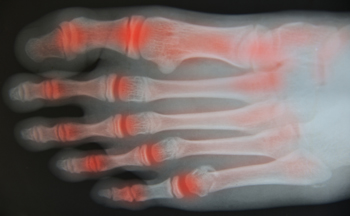 Osteoarthritis is a common joint disease that is caused by degeneration of cartilage, a layer of tissue that lines the ends of bones and helps them move smoothly. When the cartilage is worn away, the bones begin to rub directly against each other as they move, leading to pain, swelling, and joint stiffness. Osteoarthritis often affects the joints in the feet and ankles. In addition to the symptoms of arthritis itself, this condition can also cause other foot problems, such as bunions, hallux rigidus, and corns and calluses. Osteoarthritis is associated with aging and tends to affect people over age 45. People who are overweight or obese, have a family history of osteoarthritis, or have a medical history of rheumatoid arthritis or gout are most at risk. If you are experiencing symptoms of osteoarthritis in your feet or ankles, please consult with a podiatrist.
Osteoarthritis is a common joint disease that is caused by degeneration of cartilage, a layer of tissue that lines the ends of bones and helps them move smoothly. When the cartilage is worn away, the bones begin to rub directly against each other as they move, leading to pain, swelling, and joint stiffness. Osteoarthritis often affects the joints in the feet and ankles. In addition to the symptoms of arthritis itself, this condition can also cause other foot problems, such as bunions, hallux rigidus, and corns and calluses. Osteoarthritis is associated with aging and tends to affect people over age 45. People who are overweight or obese, have a family history of osteoarthritis, or have a medical history of rheumatoid arthritis or gout are most at risk. If you are experiencing symptoms of osteoarthritis in your feet or ankles, please consult with a podiatrist.
Arthritis can be a difficult condition to live with. If you are seeking treatment, contact one of our podiatrists from James Kutchback, DPM, CWS-P. Our doctors can provide the care you need to keep you pain-free and on your feet.
Arthritic Foot Care
Arthritis is a term that is commonly used to describe joint pain. The condition itself can occur to anyone of any age, race, or gender, and there are over 100 types of it. Nevertheless, arthritis is more commonly found in women compared to men, and it is also more prevalent in those who are overweight. The causes of arthritis vary depending on which type of arthritis you have. Osteoarthritis for example, is often caused by injury, while rheumatoid arthritis is caused by a misdirected immune system.
Symptoms
- Swelling
- Pain
- Stiffness
- Decreased Range of Motion
Arthritic symptoms range in severity, and they may come and go. Some symptoms stay the same for several years but could potentially get worse with time. Severe cases of arthritis can prevent its sufferers from performing daily activities and make walking difficult.
Risk Factors
- Occupation – Occupations requiring repetitive knee movements have been linked to osteoarthritis
- Obesity – Excess weight can contribute to osteoarthritis development
- Infection – Microbial agents can infect the joints and trigger arthritis
- Joint Injuries – Damage to joints may lead to osteoarthritis
- Age – Risk increases with age
- Gender –Most types are more common in women
- Genetics – Arthritis can be hereditary
If you suspect your arthritis is affecting your feet, it is crucial that you see a podiatrist immediately. Your doctor will be able to address your specific case and help you decide which treatment method is best for you.
If you have any questions please feel free to contact our offices located in The Woodlands and Woodville, TX . We offer the newest diagnostic tools and technology to treat your foot and ankle needs.





